Balbharti Maharashtra State Board Class 8 Civics Solutions Chapter 4 The Indian Judicial System Notes, Textbook Exercise Important Questions and Answers.
Class 8 Civics Chapter 4 The Indian Judicial System Questions And Answers Maharashtra Board
The Indian Judicial System Class 8 Questions And Answers Chapter 4 Maharashtra Board
Class 8 Civics Chapter 4 The Indian Judicial System Textbook Questions and Answers
1. Choose the correct option and complete the statements:
Question 1.
Laws are made by …………………. .
(a) Legislature
(b) Council of Ministers
(c) Judiciary
(d) Executive
Answer:
(a) Legislature

Question 2.
The Chief Justice of Supreme Court is appointed by the …………………… .
(a) Prime Minister
(b) President
(c) Home Minister
(d) Law Minister
Answer:
(b) President
2. Explain the concepts:
Question 1.
Judicial Review:
Answer:
- The Constitution is the fundamental law of the nation and to protect it is the prime responsibility of the Supreme Court.
- The Parliament cannot pass any law that violates the Constitution.
- Every act or policy made by the Executive should be consistent with the Constitution.
- If any law passed by the Legislature or any act of the Executive violates any provision of the Constitution, the said law or act is declared illegal.
- So, it is struck down by the Supreme Court.
- This power of the Supreme Court is known as Judicial Review.
Question 2.
Public Interest Litigation (PIL):
Answer:
- Public Interest Litigation (PIL) refers to litigations filed on issues of public importance and issues related to the welfare of the people.
- It can be filed by individual citizens, social organisation or Non-Governmental Organisations (NGOs) on behalf of all the people.
- Issues related to rehabilitation of people who have lost their homes/lands, protection of environment, protection of the weaker sections of society, etc. have been effectively handled through PIL.
- PILs are effective tool which require minimum expenditure and get immediate justice.
3. Write short notes on:
Question 1.
Civil Law:
Answer:
- It is one of the two main branches of law.
- It deals with conflicts which affect or interfere with the rights of an individual.
- Conflicts regarding land and property, rent agreement, divorce, etc. are included under Civil law.
- After filing a petition in the relevant court, the court gives a decision.

Question 2.
Criminal Law:
Answer:
- Serious crimes are dealt under Criminal law.
- Crimes like theft, robbery, dowry, murder, etc. are included under Criminal law.
- In these cases, the first step is to file a ‘First Information Report’ (FIR) with the police, who investigate the matter and file a petition in the court.
- If the charges are proved, there are provisions for severe punishment.
4. Answer in brief:
Question 1.
Why are laws necessary in society?
Answer:
- Differences in opinions, thoughts, perspectives, different cultures of people give rise to conflicts. These conflicts can be resolved impartially by the Judiciary.
- Social justice and equality in society can be established with the help of law.
- It also helps to bring weaker sections of the society, women, children differently-abled and transgenders into the mainstream of the society.
- Law helps the common man to get the benefits of values of freedom, equality and democracy.
- Law helps to protect the rights of the people.
-
It prevents emergence of repressive and authoritarian groups and individuals.
Hence, laws are necessary in society.
Question 2.
Enumerate the functions of the Supreme Court.
Answer:
The functions of the Supreme Court are as follows:
- As a federal court, it has the responsibility to settle disputes between the centre and the states; and states on one side and states on the other.
- It gives orders to relevant authorities to protect the fundamental rights of the people.
- It has the power to review decrees and orders of the lower courts and also review its own decisions.
- It provides necessary advice to the President if he/she asks for advice to understand the legal aspects in matters of public importance.
Question 3.
Which are the provisions that preserve the independence of the judiciary?
Answer:
The Constitution has made following provisions to preserve the independence of the judiciary:
- To avoid any political pressure, judges are appointed by the President.
- Judges enjoy the security of tenure. They cannot be removed from the post for trivial reasons or for political motives.
- The salaries of the judges are drawn from the Consolidated Fund of India. No discussion regarding this takes place in the Parliament.
- Personal criticism cannot be made on judges for their acts and decisions. It is considered as contempt of court and is a punishable offence.
- The Parliament cannot discuss the decisions of the judges.

5. Complete the table:
Question 1.
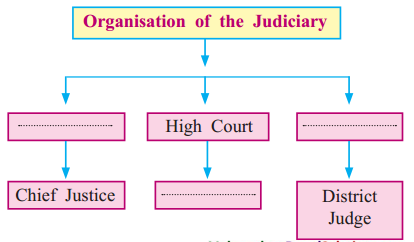
Answer:
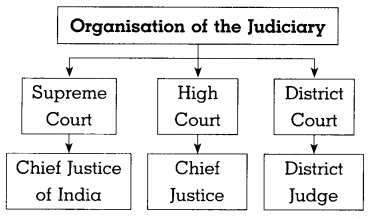
See this example:
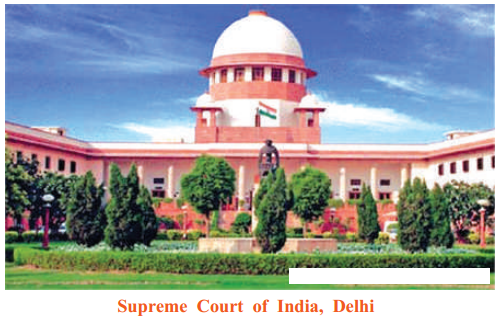
1. The court had asked the candidates contesting in elections to declare their property and income details and educational qualifications through or affidavit.
2. The idea behind this was to ensure that the voters will vote on the basis of accurate information about the candidates.
3. This is an attempt to make our election process more transparent.
4. It is mandatory for the contesting candidates to declare whether there are any charges filed against them,
and the nature of the charges whether civil or criminal also has to be declared.
Do it:
High Courts having jurisdiction over more than one state:
- Mumbai High Court: Maharashtra, Goa and Union Territories of Diu Daman and Dadra-Nagar Haveli.
- Guwahati High Court: Arunachal Pradesh, Assam, Mizoram and Nagaland.
- Kerala High Court: Kerala and Union Territory of Lakshadweep islands.
- Kolkata High Court: West Bengal and Union Territory of Andaman and Nicobar islands.
- Chandigarh High Court: Punjab and Haryana.

Project:
Question 1.
Organise a Moot Court’ in your school, prepare and ask questions related to Public Interest Litigations in this Moot Court.
Question 2.
Visit the nearest police station and understand the procedure of filing a First Information Report (FIR) with the help of your teacher.
Class 8 Civics Chapter 4 The Indian Judicial System Additional Important Questions and Answers
Choose the correct option and complete the statements:
Question 1.
When the common man benefits from the values of freedom, equality and justice, it leads to the widening and deepening of ……………… .
(a) values
(b) democracy
(c) Judiciary
(d) Law
Answer:
(b) democracy
Question 2.
…………. helps to protect the rights of people.
(a) Prime Minister
(b) President
(c) Judiciary
(d) Social Organisation
Answer:
(c) Judiciary
Question 3.
The …………. is the fundamental law of the nation.
(a) Parliament
(b) Judiciary
(c) Constitution
(d) President’s order
Answer:
(c) Constitution

Question 4.
If any law passed by the Legislature or any act of the Executive violates any provision of the Constitution, the said law or act can be declared illegal by the ………….
(a) Prime Minister
(b) Speaker
(c) President
(d) Supreme Court
Answer:
(d) Supreme Court
Question 5.
The …………. has the power to establish a High Court in every state of India.
(a) Supreme Court
(b) Parliament
(c) President
(d) Prime Minister
Answer:
(b) Parliament
Question 6.
Currently, there are ……………. High Courts in India.
(a) 20
(b) 29
(c) 24
(d) 22
Answer:
(c) 24
Find and write:
Question 1.
Nature of Judiciary in India:
Answer:
Integrated System

Question 2.
In the criminal cases, the first step is to file:
Answer:
First Information Report (FIR)
Question 3.
The District judges are appointed by
Answer:
The Governor
Question 4.
The High Court judges are appointed by:
Answer:
The President.
Complete the following concept map:
Question 1.
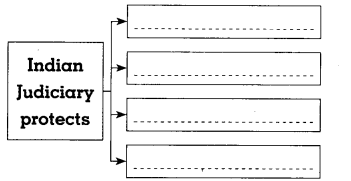
Answer:
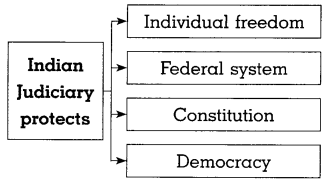
Write short notes on:
Question 1.
Judicial Activism:
Answer:
- The courts settle the disputes whenever they are approached for that purpose.
- But, in the recent times, this image of the courts has undergone a change.
- They have become increasingly active.
- The courts are now trying to fulfill the constitutional goals of justice and equality.
- The courts have tried to provide legal protection to the marginalised sections of society, women, tribal, workers, farmers and children.
- Public Interest Litigations related to issues like victimisation of women, malnourishment among children, etc. have played an important role in boosting Judicial Activism

Question 2.
High Court:
Answer:
- The Indian Constitution confers the Parliament with the power to establish a High Court in each constituent state in the Union.
- Normally, each state has a High Court. But, in certain cases where the population and area of the states is less, one High Court has jurisdiction over more than one state.
- For example, the Bombay High Court’s jurisdiction covers the states of Maharashtra and Goa, and the Union Territories of Dadra and Nagar Haveli and Daman and Diu.
- Currently, there are 24 High Courts in India.
Question 3.
Supreme Court of India:
Answer:
- Judiciary in India is an integrated system where Supreme Court is at the apex position.
- The Chief Justice of India (CJI) is the head of the Supreme Court of India.
- By convention, the seniormost judge of the Supreme Court is appointed as the Chief Justice.
- The President appoints the Chief Justice of India and other judges of the Supreme Court.
- The Supreme Court of India is located at New Delhi.
Explain the following statements with reasons:
Question 1.
Judiciary in India is an integrated system.
Answer:
- India is a Union of States. The Centre and the Constituent States have a separate Legislature and Executive.
- But there is one judicial system for the whole of India.
- The Supreme Court is the apex court under which there are High Courts.
- The High Courts control the district courts and below them are the lower courts. Hence, this structure makes Judiciary in India an integrated system.

Question 2.
The Constitution has made provision for independence of Judiciary.
Answer:
1. The Constitution wants Judiciary to work freely, without any kind of pressure.
2. The independence of the judiciary is maintained so as to enable the judges to fearlessly carry out the function of giving justice.
For this purpose, the Constitution has made provisions for independence of Judiciary.
Question 3.
The Indian judiciary has made a significant contribution in the development of the country.
Answer:
- The Indian judiciary has always given importance to social values while protecting the Constitution.
- It has exposed wrong practices like superstitions, discrimination, injustice to weaker sections, etc. and forced the legislature to pass laws against them.
- It has protected individual freedom, the federal system and the Constitution of India.
- Common people have a lot of respect and trust in the judicial system.
Thus, the Indian judiciary has made a significant contribution in the development of the country.
Answer in brief:
Question 1.
What are the eligibility criteria for appointment of Supreme Court judges?
Answer:
The eligibility criteria laid down by the Constitution for appointment of Supreme Court judges are as follows:
- He/She must be a citizen of India.
- He/She must be a legal expert.
- He/She must have served as a High Court judge or as an experienced advocate in the High Court.
Question 2.
Mention the functions of the High Court.
Answer:
The functions of the High Court are as follows:
- To supervise over the District and other lower courts in its jurisdiction.
- To maintain control over the functioning of the lower courts.
- To give orders to protect the fundamental rights of the citizens.
- To give advice to the governor while appointing judges in the district courts.

Question 3.
Should the Supreme Court have the power of Judicial Review?
Answer:
The Supreme Court must have the power of Judicial Review for following reasons:
- Protecting the Constitution is the most important responsibility of the Supreme Court.
- Many a times, laws violating the Constitution are passed under public pressure or for gaining popularity.
- The Executive may pass laws or frame policies violating the Constitution.
- Laws violating the fundamental rights of the citizens may be passed which may prove to be harmful for democracy.
- The power of Judicial Review helps in curbing all anti-constitutional practices and protects and strengthens democracy.
- It also helps in keeping the Executive under control.
Question 4.
Why does the President seek the advice of the Supreme Court on any issue of public importance? Can you tell?
Answer:
- Decisions taken on issues of public importance have long-lasting effect on the lives of the people.
- Such decisions should also be according to the Rule of Law which treats everyone equally.
- Care has to be taken that such decisions should not violate the Constitution.
- Since the President is not a legal expert, he has to seek advice of the Supreme Court on any issues of public importance.